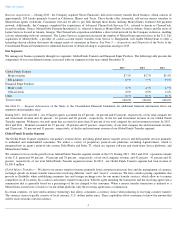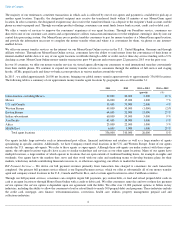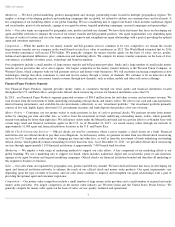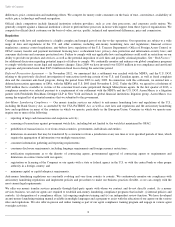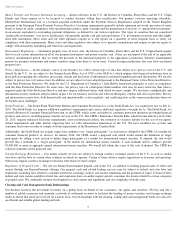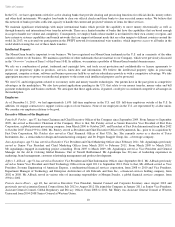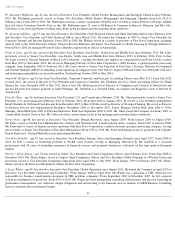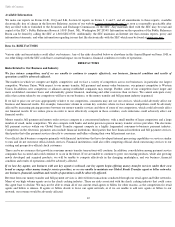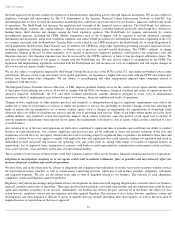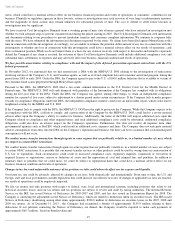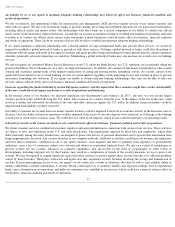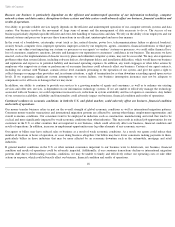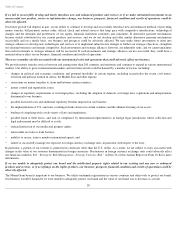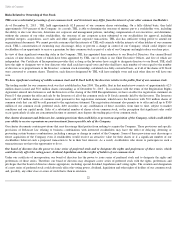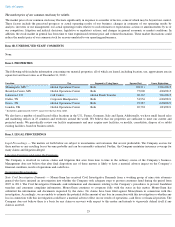MoneyGram 2013 Annual Report Download - page 17
Download and view the complete annual report
Please find page 17 of the 2013 MoneyGram annual report below. You can navigate through the pages in the report by either clicking on the pages listed below, or by using the keyword search tool below to find specific information within the annual report.
Table of Contents
status, which could have a material adverse effect on our business, financial position and results of operations or consumers’
confidence in our
business. Plaintiffs or regulatory agencies in these lawsuits, actions or investigations may seek recovery of very large or indeterminate amounts,
and the magnitude of these actions may remain unknown for substantial periods of time. The cost to defend or settle future lawsuits or
investigations may be significant.
We have received Civil Investigative Demands from a working group of nine state attorneys general who have initiated an investigation into
whether we took adequate steps to prevent consumer fraud during the period starting in 2007. The Civil Investigative Demands seek information
and documents relating to our procedures to prevent fraudulent transfers and consumer complaint information. We continue to cooperate fully
with the states. We have submitted the information and documents requested by the states. No claims have been filed against MoneyGram at this
time in connection with this investigation. Accordingly, we are unable to estimate the potential dollar amount of any loss in connection with this
investigation or whether any loss in connection with this investigation could have a material adverse effect on our results of operations, cash
flows or financial position. While we do not believe there is a basis for any claim or recovery with respect to this matter and intend to vigorously
defend the Company if any claim is asserted, the outcome of these Civil Investigative Demands could include additional compliance costs and
substantial fines, settlements or expenses and may adversely affect our business, financial condition and results of operations.
We face possible uncertainties relating to compliance with and the impact of the deferred prosecution agreement entered into with the U.S.
federal government.
In November 2012, we announced that we had entered into a DPA with the MDPA/U.S. DOJ relating to the investigation of transactions
involving certain of the Company’s U.S. and Canadian agents, as well as its fraud complaint data and consumer anti-
fraud program, during the
period from 2003 to early 2009. Under the DPA, the Company agreed to pay to the U.S. a $100.0 million forfeiture that is available to victims of
the consumer fraud scams perpetrated through MoneyGram agents.
Pursuant to the DPA, the MDPA/U.S. DOJ filed a two-
count criminal Information in the U.S. District Court for the Middle District of
Pennsylvania. The MDPA/U.S. DOJ will seek dismissal with prejudice of the Information if the Company has complied with its obligations
during the five-
year term of the DPA. Under the DPA, the Company has agreed, among other things, to retain an independent compliance
monitor for a period of five years, subject to adjustment to a shorter period under certain circumstances. If the Company fails to make progress
towards its compliance obligations under the DPA, the independent compliance monitor could issue an unfavorable report, which could lead to
heightened scrutiny by the MDPA and U.S. DOJ.
If the Company fails to comply with the DPA, the MDPA/U.S. DOJ have the right to prosecute the Company. While the Company expects to be
in compliance with the DPA, a failure to comply, and a prosecution of the Company by the MDPA/U.S. DOJ, could lead to a severe material
adverse effect upon the Company’
s ability to conduct its business. Additionally, the terms of the DPA will impose additional costs upon the
Company related to compliance and other required terms, and such additional compliance costs could be substantial. Additional compliance
obligations could also have an adverse impact on the Company's operations. Furthermore, this does not resolve all inquiries from other
governmental agencies such as FinCEN, which could result in additional costs, expenses and fines. The Company does not anticipate material
adverse consequences from entry into the DPA on the Company’
s reputation and business, but there can be no assurance that such unanticipated
consequences will not occur.
We conduct money transfer transactions through agents in some regions that are politically volatile or, in a limited number of cases, which
are subject to certain OFAC restrictions.
We conduct money transfer transactions through agents in some regions that are politically volatile or, in a limited number of cases, are subject
to certain OFAC restrictions. It is possible that our money transfer services or other products could be used by wrong-
doers in contravention of
U.S. law or regulations. Such circumstances could result in increased compliance costs, regulatory inquiries, suspension or revocation of
required licenses or registrations, seizure or forfeiture of assets and the imposition of civil and criminal fees and penalties. In addition to
monetary fines or penalties that we could incur, we could be subject to reputational harm that could have a material adverse effect on our
business, financial condition and results of operations.
Changes in tax laws and unfavorable outcomes of tax positions we take could adversely affect our tax expense and liquidity.
Our future tax rate could be adversely affected by changes in tax laws, both domestically and internationally. From time to time, the U.S. and
foreign, state and local governments consider legislation that could increase our effective tax rates. If changes to applicable tax laws are enacted,
our results of operations could be negatively impacted.
We file tax returns and take positions with respect to federal, state, local and international taxation, including positions that relate to our
historical securities losses, and our tax returns and tax positions are subject to review and audit by taxing authorities. The Internal Revenue
Service, or the IRS, has issued Notices of Deficiency for 2005-
2007 and 2009, and has also issued an Examination Report for 2008. The
Company is contesting the adjustments in the Notices of Deficiency, which are related to deductions taken on securities losses. The IRS issued
Notices of Deficiency disallowing among other items approximately
$900.0 million
of deductions on securities losses in the 2007, 2008 and
2009 tax returns. As of December 31, 2013 , the Company had recognized a benefit of approximately $139.9 million
relating to these
deductions. If our petitions contesting the Notices of Deficiency are denied, the Company would be required to make cash payments of
approximately $60.7 million , based on benefits taken and
15


